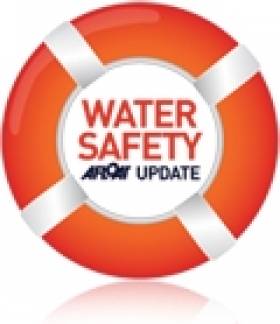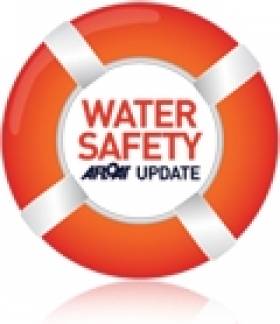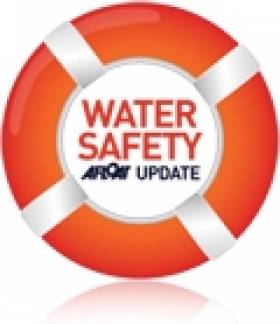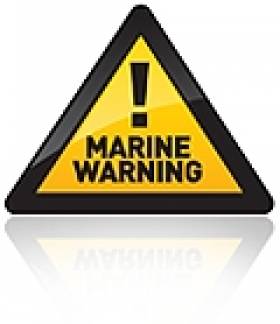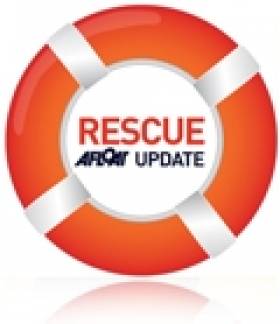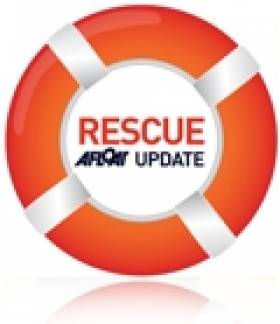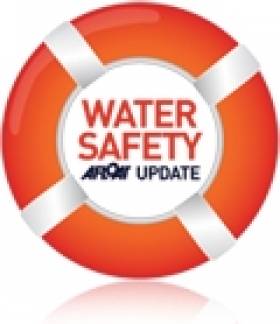Displaying items by tag: water safety
Play safe with your life - 112 lost to drowning last year
- Swim with others, not alone.
- Swim parallel and close to the shore within your depth.
- Never use inflatable toys in open water.
- Never swim out after anything drifting.
- Pay attention to signs on the beach.
- Never swim in the dark or late at night.
- Swim in familiar places, avoid strange places.
- Avoid staying in the water too long.
- Never swim out to sea.
- Do what the lifeguard tells you - lifeguarded waterways are listed at www.iws.ie
- Don't be a bully
- Digest food before swimming.
- Wait a while before swimming if you're hot or tired.
- Learn to use equipment before trying it out.
- Learn resuscitation skills.
Use days of inclement weather that keep children indoors as an ideal opportunity for them to learn all about staying safe by logging onto Irish Water Safety's website for children, www.aquaattack.ie which contains games, exercises and advice so that children know how to stay safe in, on and around water. Water-safety advice that will safe life: Although the number of drownings in 2010, at 112, was the lowest on record since 1952, we will only continue this welcome decline if the following rules, however familiar they seem, are never taken for granted:
Wear a Lifejacket. Find out what device suits your needs at www.iws.ie. Avoid unsupervised areas. Whenever possible, swim in an area that has a lifeguard. Irish Water Safety has details of all lifeguarded waterways nationwide.
Stay vigilant abroad. The picture-postcard scenes at venues abroad can often mask hidden dangers. Beaches and swimming pools may not be guarded and warning signs may differ. 14 people drowned whilst on holiday abroad in 2010, 17 the year before.
Learn swimming and lifesaving. Irish Water Safety has swimming and lifesaving classes for children and adults. Log on to find one near you at www.iws.ie.
Take lessons when you try a new water sport. Start your lessons before your trip. Be sure you tell a responsible adult where you plan to go.
Never go alone. You'll be safer and have more fun if you pair up with another adult for water sports. If one of you gets into trouble, the other can help - and call for additional help if necessary. Always wear a Personal Flotation Device.
Watch for changing weather. Be prepared to get out of the water and take cover if the skies look threatening.
Avoid alcohol. Water sports and alcohol don't mix. Tragically, alcohol is often a factor in adult deaths from drowning or injuries incurred in the water. Alcohol impairs judgment, balance and coordination - all essential for swimming and boating well and avoiding hazards in the water.
Watch children constantly. Children are irresistibly attracted to water. Take the time to protect your children from the dangers of water. Teach them in advance at www.aquaattack.ie.
An analysis of drowning statistics for 2010 is available here.
Graphic Water Safety Ads Could Save Lives - Jim Higgins MEP
"Water is our most valuable and deadly resource. On average 150 people drown in Ireland each year. Most of these tragic deaths happen inland, in rivers or lakes or around farms and homes."
"These accidents are completely preventable and usually stem from a lack of awareness of basic water safety principles. All too often water safety education is confined to sea bordering communities this must clearly change."
"I have written to Minister Quinn proposing that water safety education be as prevalent in national schools as the 'safe cross code.'
Adolescents under the influence of alcohol and males over the age of sixty-five are also in the high risk category "thus highlighting the need for adult water safety courses."
Thankfully the average drowning figures in Ireland have decreased from 173 people in the late 1990's and early 2000's despite the increased popularity of water sports. Higgins commended the work of the Irish Water Safety Organisation & Simon Coveney who recently launched the 'Wearing a Lifejacket May Save Your Life,' "this is exactly the type of initiative that is needed, but we need to go even further in order to spread the water safety message to ordinary swimmers."
Despite the recent reduction in drowning incidents our attention must remain with the 150 lives needlessly lost. "These deaths are 100% preventable and everybody needs to assume responsibility to ensure that they are informed about water safety practices and that they in turn inform or responsibly supervise their children."
"I am calling for the introduction of powerful, strong and graphic ads similar to those issued by the RSA so that the dangers of water are not ignored."
Higgins continued to emphasis that basic advice available online or from local swimming pools could save lives and help us ensure that we go further than the current 20% reduction in drowning accidents."
Further information:
Irish Water Safety Guide to Safe Swimming:
- Do not swim alone
- Do not swim just after eating
- Do not swim when you are hot or tired
- Do not swim in strange places
- Do not swim out after anything drifting
- Do not swim out to sea
- Do not stay in the water too long
- Swim parallel and close to the shore
- Do what the lifeguard tells you
- Never use inflatable toys
- Pay attention to signs on the beach
- Do not be a bully
- Learn to use equipment before trying it out
Firm Offers Security for Wexford Lifebuoys
A security firm based in Wexford town has offered electronic protection and 24-hour monitoring to Wexford County Council in a bid to secure funding for lifebuoys on Wexford Bridge.
According to the Wexford People, the move comes after a spate of accidents involving people falling from the bridge, which is one of the longest in Ireland. The original lifebuoys were removed several years ago due to vandalism.
SAR Ireland has more on the story HERE.
Heat Waves Masks the Danger of Cold Water
The CEO of Irish Water Safety, John Leech, has today warned about the increased risk of water related accidents and tragedies this weekend, thousands of marine leisure enthusiasts will take to our waters this weekend to enjoy our unique waterways. Complacency has been a factor in many Bank Holiday drownings. The public must take steps, including wearing a lifejacket to avoid becoming a drowning statistic. On average, twelve drownings occur in Ireland every month. We have lost too many people this year already, mainly because people did not wear a lifejacket.
Swimming, diving, angling, canoeing, surfing, windsurfing and kite surfing are popular holiday activities, ensure that you are adequately trained to undertake them and don't over face yourself early in the season.
Children are fascinated and attracted to water, it is critical that adults supervise children at all times around water, particularly children visiting farms where slurry tanks and open water is often unprotected.
Alcohol is a contributory factor in almost 30% of drownings, therefore I ask the public not to drink near water this weekend.
If you have not used your lifejacket or buoyancy since last year then you will need to carry out the following checks.
Detailed information on PFD's at http://www.iws.ie/guides-page24421.html
· If you are in distress or in doubt of somebody's safety, then call 112 and ask for the Coast Guard.
For water safety information for children www.aquaattack.ie
To report missing ringbuoy's www.ringbuoys.ie
For more information and details of water safety classes in your area log on to www.iws.ie or LoCall Irish Water Safety on 1890 420 202.
Flood Evacuation Exercise in Fingal This Weekend
Members of the public are invited to attend a major flood evacuation training exercise this Saturday at Broadmeadow Esturary in Swords, Co Dublin.
Rescue and boat rescue crews from the Irish Coast Guard are sceduled to join teams from the Dublin Fire Brigade, the Civil Defence Fire Service and Gardaí in the exercise, which will simulate the rescue of a group of people stranded after a flash flood.
The crews will test water rescue and river search procedures, with an emphasis on general water safety and providing assistance to other search and rescue agencies.
The excercise will begin at 11am on Saturday 16 April and will last for one hour. Members of the public are welcome to observe must must obey any instructions and must not interefere with the exercise.
For more information contact Bill Powderly, assistant chief Civil Defence officer with responsibility for the Fingal Area, at [email protected] or 086 380 5197.
Lifeguards Wanted in Fingal
Fingal County Council is currently welcoming applications for weekend and weekday lifeguards for the 2001 summer season.
Anyone aged at least 17 years on 1 May 2011 is eligible to apply.
Application forms are available from Fingal County Council, Operations Department 2nd Floor, Grove Road, Blanchardstown, Dublin 15 or from the reception desk at County Hall in Swords.
Alternatively forms can be downloaded from www.fingalcoco.ie or from Irish Water Safety's website at www.iws.ie.
The closing date for applications is 4.30pm on Friday 8 April.
New Rescue Boat Launched for Ballybunion Sea and Cliff Rescue Service
Ballybunion Sea & Cliff Rescue Service in North Kerry officially launched their new Atlantic 75 rescue boat yesterday.
After three years of negotiations and build time the 7.5 metre Rigid Inflatable Boat arrived earlier this year. After several months of sucessful sea trials the boat entered full active service at the weekend, althought its first call out in anger occured last week to tow a stricken vessel that had lost engine power.
The unit depends fully on public donations and a small government grant to run the unit each year at a cost of over €40,000.
The boat was officially named by Derek Nagle, a member of the Duggan family in Ballybunion who have long been assosiated with the unit as supporters. The vessel was named the "Tommy C" after Tommy Duggan and his Wife Clara. The previous boat, an Atlantic 21 was named the "Clara T".
Related Safety posts
RNLI Lifeboats in Ireland
Safety News
Rescue News from RNLI Lifeboats in Ireland
Coast Guard News from Ireland
Water Safety News from Ireland
Marine Casualty Investigation Board News
Marine Warnings
Complacency Puts Children at Risk This Weekend
Children are fascinated and attracted to water, it is critical that adults supervise children at all times around water, particularly children visiting farms where slurry tanks and open water is often unprotected.
On average, thirteen drownings occur in Ireland every month. This tragic figure will decrease if the public is responsible, aware and educated on the risks around our aquatic environments.
The CEO of Irish Water Safety, John Leech, has today warned about the increased risk of water related accidents and tragedies this weekend as the number of people taking to activities in and around water will increase. Thousands of marine leisure enthusiasts will take to our waters this weekend to enjoy our unique waterways. Complacency has been a factor in many Bank Holiday drownings. The public must take steps, including wearing a lifejacket to avoid becoming a drowning statistic.
Swimming, diving, angling, canoeing, surfing, windsurfing and kite surfing are popular holiday activities, ensure that you are adequately trained to undertake them and don't over face yourself early in the season.
Water temperatures are still cold, 10°C on average around our coastline with freshwater being a few degrees cooler. The CEO cautions the public to respect the cold water temperatures and slightly below air temperatures over the weekend.
There has been a full moon on Wednesday so we shall experience declining spring tides over the weekend. The public should be aware of the following hazards:
stranding caused by strong incoming tides;
stronger than normal tidal streams;
eddies and overfalls caused by wind against tide;
Alcohol is a contributory factor in almost 30% of drownings, therefore I ask the public not to drink near water this weekend.
If you have not used your lifejacket or buoyancy since last year then you will need to carry out the following checks.
Visually Check all lifejackets and buoyancy aids for the following deficiencies:
Ensure CO2 Cartridges have not been punctured
Ensure all zips, buckles, fasteners and webbing straps are functioning correctly
Check that fitted lights are operating correctly
Check that the valve or lifejacket is not leaking by inflating the lifejacket overnight or immersing it in water checking for air bubbles
Discard any faulty lifejackets by destroying them
Detailed information on PFD's at http://www.iws.ie/guides-page24421.html
If you are in distress or in doubt of somebody's safety, then call 999 or 112 and ask for the Coast Guard.
For water safety information for children www.aquaattack.ie
To report missing ringbuoy's www.ringbuoys.ie
For more information and details of water safety classes in your area log on to www.iws.ie or LoCall Irish Water Safety on 1890 420 202.



























